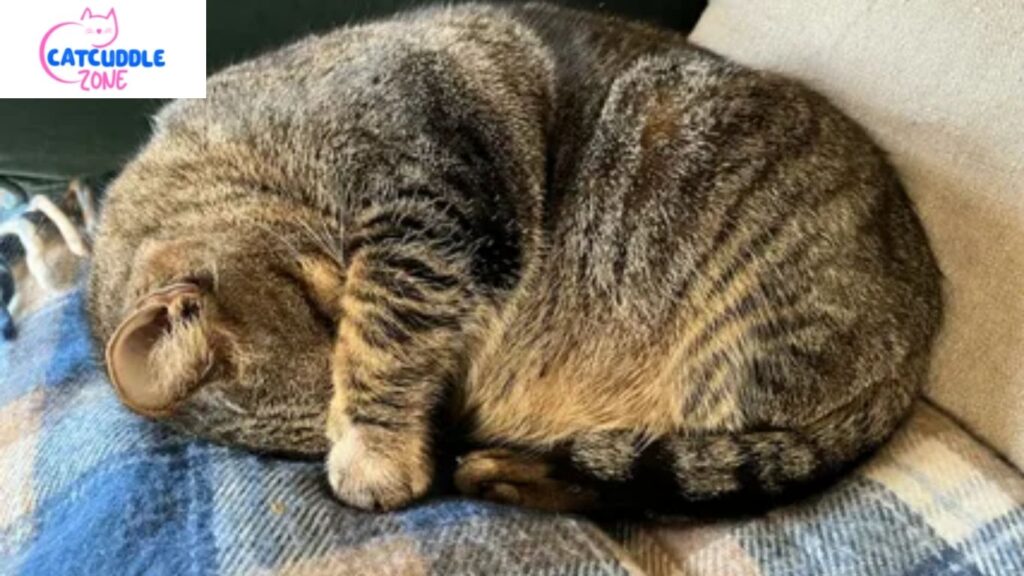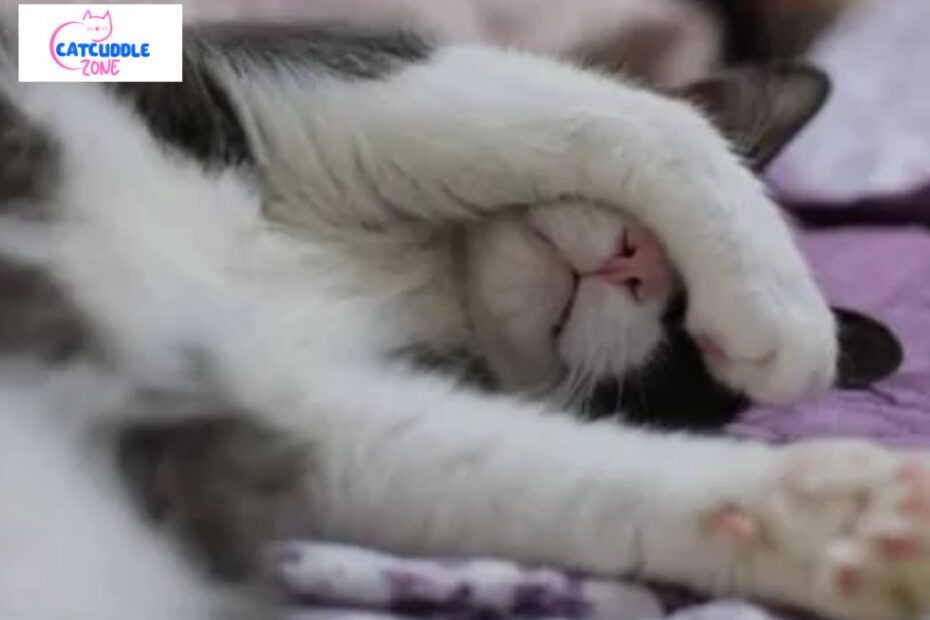Have you ever seen your cat suddenly jerk or twitch while sleeping? It can look strange or even a little scary. But in most cases, sleep twitching in kittens and adult cats is completely normal. Cats go through different feline sleep stages, just like humans. During cat REM sleep, their brains become very active, and their bodies may move.
This is usually the case when during nap time you observe the twitching of cat paw, or sudden body jerking. Many pet owners wonder, “Why do cats twitch while sleeping?” By learning about these movements, you would understand what is normal and at what point you should be ready to call your vet.
Is It Normal for Cats to Twitch in Their Sleep?
Yes, it’s usually normal. Cats, just like human beings, experience sleep stages. In the feline REM, their brain is activated. This may result in the slightest bodily movements such as twitch of the whiskers, the jerk of the paws or the twitching of the tails. The symptoms stated above are normal in REM sleep in cats.
So if you’re asking, “What does it mean when my cat jerks in its sleep?”, it likely means your cat is dreaming. The sleeping behaviors of kittens entail twitching since the nervous system is still developing in kittens. It’s a natural part of cat sleep patterns and nothing to worry about.
Why Do Cats Twitch While Sleeping?
What is the reason behind the twitching of cats? It’s mainly due to brain activity during feline sleep stages. During such REM sleeping, the brain stimulates muscles. That is why you can sometimes see cat paw twitching during nap or flicking of ears.
The second cause may be the cat muscle spasms during sleeping that are tiny and non-harmful. It might occur more frequently in kittens or adult cats. When this twitching is not very active plus when your cat is just sleeping it is normal. The next time someone complains that their kitten twitches in sleep you will know that this is how most creatures dream.
Do Cats Dream? What Science Says About Feline Sleep
Yes, cats probably dreaming in the same way as we do. Research work done on animals demonstrates that cats do go into REM sleep during which dreams occur. The behavior of the cats when dreaming can involve running movement, little meowing, or motion sleeping cat as they are replaying their day during their dreaming.
More Twitching in young cats and kittens is not unusual since they spend more time asleep, and their brain is in constant activity. So, “Can cats have nightmares?” Possibly, though it’s hard to know for sure. yet now there is a soft twitching, or a sound,–which is very likely to be a happy dream, rather than a bad one.
Is My Cat Twitching in Sleep or Having a Seizure?

It is a very crucial question. “Is my cat dreaming or having a seizure?” Normal twitching is regular, and very short. On the contrary, seizure usually consist of rigid body parts, tilting of the head, or foam in the mouth.
If you’re unsure, watch for signs of sleep seizures in cats. The difference between twitching and seizure in cats may be considered confusing; however, seizures also frequently occur as the cat is awake. When your cat appears not to react or confused following it, it might be a health problem.
Feline Hyperesthesia Syndrome: A Hidden Cause of Twitching?
Twitching can also be a part of the Feline Hyperesthesia Syndrome. It is a very unusual situation that is associated with neurological disorders in cats. FHS cats may bite a tail, runaway, or yell.
In case your cat is twitching a lot and, at the same time, demonstrates strange behavior even when awake, pay attention to the feline hyperesthesia causes. It usually requires a vet diagnosis in that it is difficult to diagnosis. So yes, “Is twitchy cat syndrome real?” It is not however the case of everybody.
When to Worry: Signs That Cat Twitching Isn’t Normal
Sometimes twitching can mean something’s wrong. If your cat shows strong jerking, stiff muscles, or won’t wake up, it could be serious. Ask yourself, “How to know if cat twitching is normal or serious?” Drooling/limpness, or wide eyes are some of the other symptoms to look out for.
The unnatural itching found in cats is usually more violent, and more persistent. If your cat seems dazed after waking or can’t walk properly, call your vet. It may indicate neurological illnesses in cats or sleep seizures.
Should I Wake My Cat Up If They’re Twitching?
Many people ask, “Should I wake my cat if it’s twitching?” If the twitching is gentle, let your cat dream. Cat REM sleep is healthy and waking them too often can disturb their cycle.
However, if twitching looks painful or your cat shows distress, you might gently call their name. Still, avoid shaking or grabbing them. Wondering, “Is sleep twitching painful for cats?” Not usually, unless it’s linked to a medical problem.
My Cat Is Twitching in Sleep and Won’t Wake Up – What Should I Do?
This can be scary. If cat twitching while sleeping and not waking up, try calling their name softly. Some cats sleep deeply, especially in REM. It doesn’t always mean danger.
But if they don’t respond after a while or feel stiff, seek help. Ask your vet, “How to monitor cat seizures during sleep?” Record the movements, their durations and post-waking activities of your cat.
How Much Sleep Do Cats Need, and Do They Sleep at Night?
Adult cats sleep 12–16 hours a day. Kittens and seniors may need up to 20 hours. Cat sleep problems can happen if they don’t get enough rest. Cats are crepuscular, so they are active at dawn and dusk.
If your cat seems restless at night or sleeps too much, it might be worth checking with your vet. Too much cat REM sleep or too little deep sleep can lead to more twitching.
When to Call the Vet: Your Complete Checklist
Here’s a quick table to help you decide if your cat’s twitching is normal or not:
| Twitching Type | Normal | Call Vet |
| Soft paw flicking | Yes | No |
| Ears twitching occasionally | Yes | No |
| Stiff legs or head jerking | No | Yes |
| Won’t wake up after long time | No | Yes |
| Foam at the mouth or drooling | No | Yes |
| Confusion or limping after sleep | No | Yes |
If your cat shows any “No” signs, don’t wait. Contact your vet and explain what you saw. Videos help too.
Final Thoughts: Should You Be Concerned About Your Cat’s Sleep Twitching?
So, “Are sleep twitches in cats dangerous?” In the majority of the cases, no. They are part and parcel of feline REM stage. Your cat can be dreaming about predation or playing.
But if you’re ever in doubt or see signs of seizures, it’s best to get a vet’s advice. Next time someone asks, “Why does my kitten twitch while sleeping?” or “My cat is twitching and acting weird—should I worry?”, you’ll have the answers ready.
Frequently Asked Questions
1. Is it normal for cats to jerk while sleeping?
Yes, it’s normal. Most cats jerk or twitch during REM sleep when they are dreaming.
2. What does it mean when a cat jerks?
It usually means your cat is in a deep sleep and experiencing natural sleep muscle movements or dreams.
3. Why does my cat act like a jerk?
Cats may seem rude sometimes, but it’s often playful or attention-seeking behavior, not true meanness.
4. Do cats talk in their sleep?
Yes, some cats may make soft sounds, meows, or chirps while dreaming, especially during feline REM stage.
